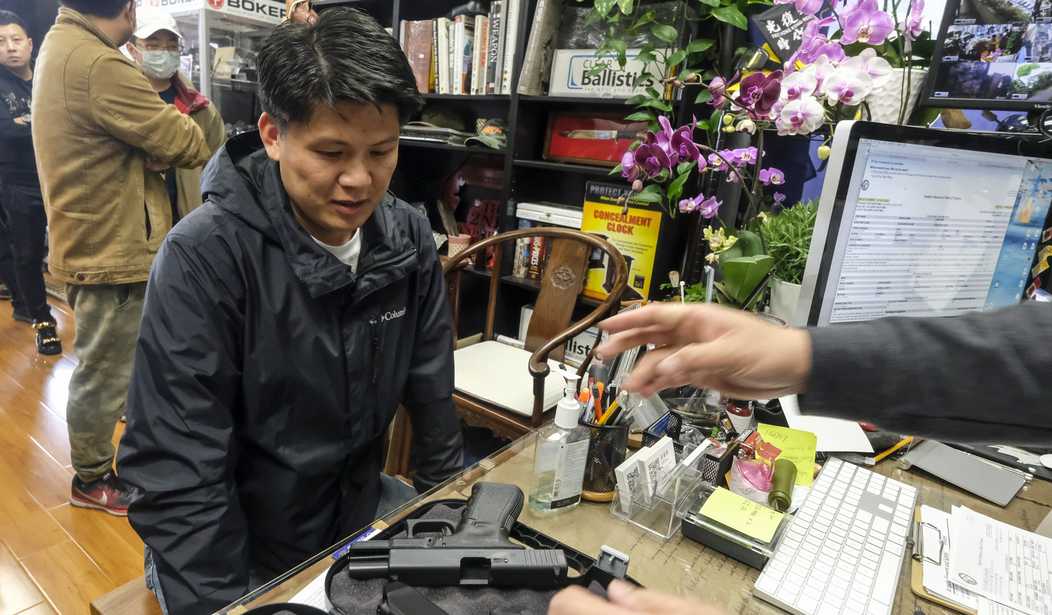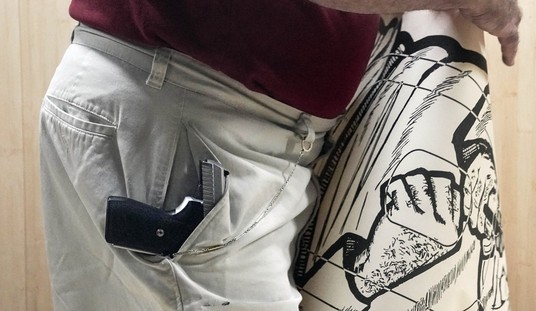California now requires credit card companies to track gun store purchases by consumers in the state. This is through a unique Merchant Category Code, or MCC, that will identify gun stores.
There was a time when this was going to be a thing throughout the nation, all driven by the financial industry itself, but backlash ended that pathetic attempt. Since then, a number of states have formally banned their use. Yeah, they backed down, but that doesn't mean they won't try to push this nonsense again.
But California thought it was a fantastic idea, and in true statist fashion, they decided to require it.
However, as Larry Keane notes, there are profound issues at work here.
Law-abiding gun owners and those who want to shop at gun stores or hunting supply outlets should be concerned, and more open to paying with cash for their purchases. Not only is the code idea misguided and flawed, simply put it is another backdoor for gun control. It’s no longer “What’s in your wallet?,” as the popular credit card tagline goes. It’s now “Who’s in your wallet?”
Take, for example, the opinion of Visa CEO Al Kelly. While the MCC code was being considered, Kelly admitted flat out the code doesn’t work as gun control activists dream it would. “If [Visa’s Chief Communications Officer] K.C. Kavanagh goes into a gun store and buys three thermoses and a tent, and you go in and buy a rifle and five rounds of ammunition, all I know is you both went to the same gun store… But I don’t know what you bought.”
USA Today noted, “The codes are a way to classify businesses by the kinds of things they sell. It can be used by financial institutions to see how a purchase should be processed, but does not identify specific items purchased.”
And Bloomberg News, the media behemoth founded by gun control activist and failed presidential candidate Michael Bloomberg – who also bankrolls the gun control group Everytown for Gun Safety, reported on the flawed dream of the firearm MCC, reiterating, “The payment network and its banking partners would have no idea if a gun-store customer is purchasing a… rifle or safety equipment.”
Implementing the firearm MCC is not the silver bullet to track down potential criminals that gun control activists want it to be. It’s wishful thinking — or California dreamin’ in the case of the first state to force the code into place.
That's a massive issue with it, and the idea that you can effectively track anything such as physical goods someone buys with a code for the kind of store it is shouldn't even make sense.
Credit cards can't see into your shopping bag. They have no clue at all what you're actually buying, nor have credit card companies ever cared to do so.
The idea that the codes would allow the same kind of detection the companies use for financial crimes is laughable, again because you don't know what anyone is buying.
For example, someone could predominantly prefer their clothes to come from someplace like Bass Pro Shops. The company has a lot of clothing on its showroom floors. Picking up a new wardrobe after dropping a pile of weight would still come up as a gun store purchase because the code would be the same. Bass Pro Shops sell guns, after all.
Someone getting into fishing might be in the store regularly picking up bits and bobs they need for their new outdoor adventures. That, too, would show up.
How are these tracking protocols designed to look for money laundering going to figure out what's a problem and what isn't? The short answer is that they won't. They'll be completely and utterly clueless.
But if companies relegate information to the authorities--as was originally proposed--there are other problems.
In addition, the U.S. Treasury’s Financial Crimes Enforcement Network (FinCEN), which Sorkin and Amalgamated Bank President and CEO Priscilla Sims Brown pushed as the agency to handle all those “suspicious activity reports” from the credit card companies, admitted to U.S. Sen. Tim Scott (R-S.C.) in a letter that it violated the Fourth Amendment rights of law-abiding citizens that protect against illegal search and seizure when it collected the credit card purchase history from banks and credit card companies of individuals who purchased firearms and ammunition in the days surrounding Jan. 6, 2020.
That means doing similar with gun store purchases--not just gun purchases, as we've noted--would also be a Fourth Amendment violation.
The truth of the matter is that this won't do what many think.
Meanwhile, California has a problem with being unable to keep people from taking dumps on the sidewalk, from keeping habitual drug users from leaving their needles next to those piles of human excrement and keeping criminals locked up so they can't hurt innocent people.
The last thing they need there is taxing the authorities even more by reporting law-abiding citizens and their gun purchases.








Join the conversation as a VIP Member